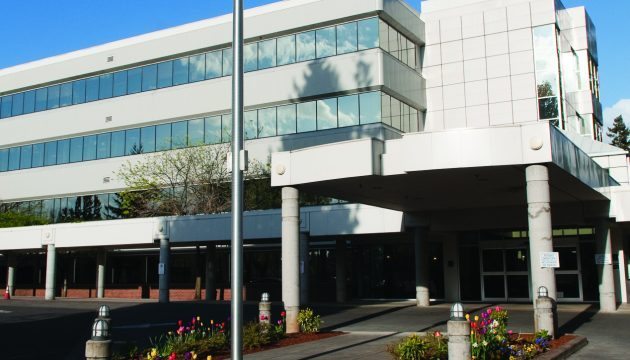Weight loss surgeries use two different techniques: Restriction and malabsorption.
- Restriction reduces how much food or calories you can take in. It does this by limiting the stomach space available for food.
- Malabsorption reduces the amount of nutrients absorbed from food you eat. It does this by changing the path of your small intestine.
PeaceHealth offers three main types of bariatric surgeries. They are done using minimally invasive techniques. We offer:
- Gastric bypass, often called Roux-en-Y (sounds like roo-en-WHY) gastric bypass.
- Vertical sleeve gastrectomy (VSG), or gastric sleeve surgery.
- Duodenal switch surgery at our Southwest location.
Here’s what you need to know about each procedure:
Gastric bypass (Roux-en-Y)
- What it is: This procedure combines restriction and malabsorption for weight loss. It creates a small stomach pouch out of part of your upper stomach. The pouch is then connected to the middle part of your small intestine. It avoids your lower stomach and upper small intestine. A smaller stomach helps you to feel full faster, and you absorb fewer calories.
- How it’s done: Your surgeon separates a small portion from the top of the stomach. This pouch is about the size of an egg. Your surgeon will seal it off with surgical staples, creating your new stomach. Next, they will cut the middle of your small intestine and attach it to the stomach pouch. This bypasses the rest of your stomach and the upper part of your small intestine. Watch an animation of how it’s done.
Bypass surgery is usually done through a minimally invasive procedure. It also can be done as traditional open surgery, but this is rare at PeaceHealth. Open surgery has a larger incision. The minimally invasive option is called laparoscopic surgery. Your surgeon uses tiny incisions and a camera called a laparoscope to do the procedure. Because the incisions are smaller, your recovery time is quicker.
- How well it works: Weight loss happens quickly in the first year after gastric bypass In the second year, you’ll continue to lose weight but at a slower pace. By the end of the second year, patients on average have lost more than 60% of their extra weight. You may lose more than this, or you may lose less.
By eight years after surgery, typical patients have lost more than 50% of their extra weight. This is usually enough to improve their long-term health.
- Other considerations: When you eat after gastric bypass surgery, you’ll feel full quickly. This is because your stomach pouch is now much smaller. You’ll have a smaller appetite and eat less, helping you lose weight.
Vertical sleeve gastrectomy
- What it is: This procedure is sometimes called VSG or gastric sleeve surgery. It creates a stomach pouch about the size of a small banana — which is about 15 percent of your stomach’s original size. Like gastric bypass surgery, it restricts the amount of food you can eat. The smaller stomach pouch helps you feel full sooner. The food you eat goes through your digestive tract as usual, so you can still absorb nutrients.
- How it’s done: In a VSG procedure, your surgeon will separate your upper stomach from the rest of your stomach. They will use surgical staples to form a small pouch, which will be your new stomach. The surgery is usually done with a laparoscope and tiny incisions. This minimally invasive approach means you can recover faster. Because part of your stomach is removed, this surgery can’t be reversed. See an illustration of sleeve gastrectomy.
- How well it works: Within two years after a sleeve gastrectomy, most people lose about 60% of their extra weight.
- Other considerations: Sleeve gastrectomy is a good option for people with conditions like Crohn’s disease or anemia. This is because people who have VSG have less malabsorption (the amount of nutrients you can absorb from your intestines into your bloodstream). They are less likely to experience a common gastric bypass side effect called dumping syndrome. With dumping syndrome, eating sugary foods can cause symptoms such as nausea, sweating, stomach cramps or diarrhea.
Duodenal switch
- What it is: This procedure is highly effective, and PeaceHealth is the only bariatrics center between Vancouver and Olympia to offer it. Duodenal switch changes the size of your stomach and the length of your small intestine. It combines two techniques for greater weight loss. One is restriction (the volume of food you can eat at one time). The other is malabsorption (the amount of nutrients you can absorb from your intestines into your bloodstream).
- How it’s done: Your surgeon will first do a simple sleeve gastrectomy. This procedure uses surgical staples to shrink your stomach to about the size of a small cucumber. This limits how much food you can eat at a meal. You'll then have an intestinal bypass procedure. It is like gastric bypass, but technically different. Intestinal bypass shortens your small intestine by 50 to 75%. Food doesn’t have to travel as far from your stomach through your intestine, so you absorb fewer nutrients. See an animation of how it’s done.
- How well it works: People who have this surgery lose about 80% of their extra weight within two years. And 9 out of 10 maintain significant long-term weight loss. It works well for people with Type 2 diabetes, many of whom can stop taking diabetes medication after their surgery.
- Other considerations: Duodenal switch is a complicated procedure, so it’s not widely available. PeaceHealth Southwest does more of these operations than any other hospital in the Portland metro area. Higher volumes generally lead to better outcomes. This means you can feel confident about your surgical team's expertise.
When you consider duodenal switch, it's important to know that insurance coverage varies. Some companies have BMI restrictions and other criteria for authorization coverage for this procedure. PeaceHealth can help you check with your health plan to see what's covered for you.




